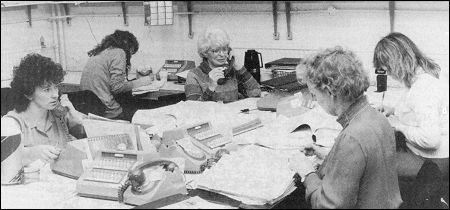| Inside Sinclair |
We meet the people who deal with your queries and complaints.
A behind-the-scenes look at the Sinclair mailing house

SINCLAIR RESEARCH computers are now in a class of their own in the home computer market, which the company has done most to create. Despite its policy of selling many of its products by mail order, however, few of its customers have had direct contact with the company.
The reason is one of its other well-known policies - sub-contracting. As much as possible of the business of making and selling Sinclair products is delegated to outside companies, allowing Sinclair Research to have a very small staff, slightly more than 50 at the moment.
Most people who manage to obtain their machines and software without too much trouble find that the nearest they get to Sinclair Research is a company which works from small offices and a warehouse on a featureless industrial estate in the Surrey town of Camberley.
The offices are those of GSI U.K., the address and telephone number of which appear in Sinclair advertisements and to which the mail order coupons are sent. It is GSI which has the task of being the first line of complaint and query, answering the growing number of Sinclair users throughout the country. It is also the GSI switchboard which plays music to soothe the patient person waiting for a query to be answered.
GSI U.K. is the British subsidiary of a French company which has built a reputation as a supplier of marketing services to the motor trade. It maintains a mailing list for a large number of motor dealers which can be used when a particular group of people need to be contacted. GSI also looks after the despatch of the information.
With its associates, GSI claims to be the biggest computer bureau for the motor trade in Europe. Its ultimate parent is CIT-Alcatel, a division of CIT, the power generating company which is the private equivalent of Britain's Central Electricity Generating Board.
The expertise for large mailings with a certain amount of mail order distribution led to the company being considered when Sinclair was looking for a distributor.

NIGEL BROWN |
"We had a good deal of experience with keeping names and addresses on file and mailing, so it was natural to start doing something like the Sinclair work," says Nigel Brown, product manager at GSI, who is in charge of the Sinclair account.
"We started working with Sinclair in October, 1980 when the ZX-80 was still being produced. Before that Sinclair had looked after the distribution and we needed only four people at that stage."
At that time the company was known as Jaserve, changing to GSI when it was taken over in April, 1981.
"With the launch of the ZX-81 in March, 1981 the work became much bigger, which was when I became the account manager," Brown adds.
Now there are 58 people working exclusively on the Sinclair contract, which has grown to become a substantial part of the British company's turnover.
Every one of the Sinclair products, the range of which now includes two computers - with different versions for the different television and power systems throughout the world - a printer, printer paper and a growing amount of software for all uses, passes through Camberley on its way to the corners of the world.
Each day two large, articulated container lorries make the long journey from Dundee to Surrey with the latest batch of Spectrums, ZX-81s and printers. Another slightly smaller lorry takes more products from the other Sinclair suppliers.
They all go into the large, highly-secure GSI warehouse but rarely stay for long. The items to be sent to distributors in export markets are sent to another warehouse, leaving GSI to deal with the distribution in Britain and those countries which have no agents.
Many items go almost immediately to the growing number of retailers now stocking the Spectrum and the ZX-81 while the rest go in batches of 50 to the mail order customers.
When the mail order system is running smoothly there is a clear number of stages in the processing of each order. Every morning the post is sorted into the queries and the orders, which are then further divided, depending on the goods required and the method of payment.
Cheques and cash are paid into a special holding account, where the money stays until the order has been satisfied; then it is transferred to the Sinclair sales account. Credit cards are not charged until the order has been fulfilled.
The orders are then entered on the computer and all the data stored on tape. When the goods are available to be sent, address labels are printed and another Spectrum or box of cassettes is ready for the post.
At the moment it is possible for GSI to say which stage a particular order has reached but not where it is within that stage. That resulted in many complaints during the Spectrum delay difficulties last year. Although an anxious customer could be told that their order had been received but was not about to be despatched, they could not find the place of their order in the queue. A new system is being installed which will allow the state of orders to be seen at a glance.
Brown adds that at the height of the problems it was difficult to be more specific, so that customers were not misled.
"We could give only general replies as he situation was always changing, so we thought it better not to give a specific answer which might then have to be altered," he says.
"Sinclair made a policy that everyone should be kept as informed about the position as possible and I think we were able to achieve that."
Most of the queries and complaints were by telephone, a customer service which has grown rapidly along with the rest of the Sinclair business. In October, 1980 there were only two lines. They have grown in stages, first to four, then eight, then 18, and last summer another 10 were added.
"In the early days on our two lines we were receiving about 100 calls a day. When the ZX-81 was launched that exploded to 1,000 a day. Now I think we probably have a capacity of about 2,000 a day," Brown says.
The calls deal with a vast number of subjects. Apart from complaints about non-delivery or faulty machines, many users need advice on particular aspects of using the machines. Some things, such as saving and loading difficulties, are the subjects of regular queries and there are almost 40 leaflets giving advice which can be sent.
For the more complicated queries there are three more technically-minded people available who attempt to find an answer.
Whatever the difficulty most of the callers are still polite. Even when the delays were at their worst last year, no one became abusive when making complaints.
The GSI position as the public face of Sinclair Research will be reduced as the retail sales of Sinclair products increases. It is likely to remain the first place people will contact with their problems and complaints and will remain an important part of a string of companies involved in the production and selling of Britain's most popular computers.